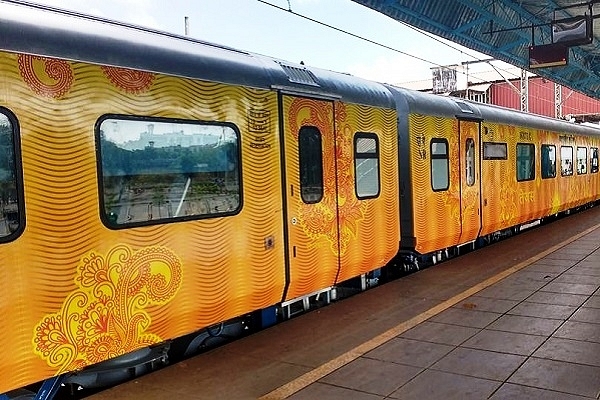
Indian Railways’ New Avatar: How The Transport Giant Is Planning A Major Privatisation Push In Train Operations
5 October 2019 is a significant day in the history of India’s transport lifeline - the Indian Railways. It will be the first time since Indian Railways began operations 174 years ago that a “private train” will begin running on its network.
This train, the New Delhi-Lucknow Tejas Express will be flagged off from Lucknow by Uttar Pradesh Chief Minister Yogi Adityanath on 4 October and will begin its commercial operations a day later in New Delhi.
While it is being dubbed as a “private train”, it is not technically true as the operations of this train would be fully managed by Indian Railways Catering and Tourism Corporation (IRCTC) - a subsidiary of Indian Railways.
The train will come with a variety of premium features like exclusive lounge access, baggage pickup and drop facility from passenger’s home and free insurance up to Rs 25 lakh.
IRCTC is also similarly expected to take over operations of Mumbai-Ahmedabad Tejas Express in the future. It has been handed over the custody of two Tejas rakes and has to pay a yearly lease amount to the railways.
The “IRCTC experiment” though is just the beginning and Indian Railways is planning on involving private players to operate its trains on key routes.
More Privatisation On The Cards
It was recently reported that as part of its 100 day action plan it is considering creating truly “privately run trains” in the coming days on several important routes with improved services and amenities for passengers.
Besides the two trains for IRCTC, the national transporter is mulling allowing private operators to manage trains on 14 additional routes, while 10 on overnight and long-distance services and four suburban services.
A Bigger Privatisation Push On The Horizon
During a recent interview to Economic Times, the Railway Board Chairman Vinod Kumar Yadav put forth Indian Railways’ ambitious privatisation plan for train operations.
As per Yadav, Indian Railways is hoping to introduce 150 privately run trains by FY24. These private operators would be expected to operate their own trainsets, introduce state of the art technology and innovative passenger amenities.
The private operators would have an option to either import their own train-sets or buy/lease them from Indian Railways.
Indian Railways is still working out the routes which will run these private trains and would float a bidding process after ironing out the specifics. As part of the 100 day plan, Railways would focus on routes with low congestion and connectivity to important tourist spots.
What Else Is Included In The 100 Days Action Plan
Introducing private train operations is just one small part of the action plan [PDF].
The other proposals include increasing the speed of New Delhi-Howrah and New Delhi-Mumbai Rajdhani Express to 160 Kmph and corporatisation of seven manufacturing units including Chittranjan Locomotive Works (CLW) and Modern Coach Factory Rae Bareli.
Indian Railways will soon begin work on an advanced signalling system which will enhance safety, improve punctuality by providing electronic information to the loco pilot which will come in handy during adverse weather conditions like fog.
Railways is also planning on introducing digital rail corridors by acquiring 10 MHz spectrum in the 700 MHz band which will help in creating a voice and data link between the train and the control tower to facilitate safer operations and increase load carrying capacity of the network.
The commissioning of the two dedicated freight corridors (DFCs) in the next two years is also certain to free up a considerable track capacity on the existing mixed-use corridors between Delhi, Kolkata, and Mumbai.
Railways has also signalled a structural change in its promotion policy wherein Divisional Railway Managers (DRM), General Managers (GM) and Board Members would be selected on the basis of performance and leadership skills.
While Railways has laid out an ambitious agenda, one key concern that needs to be addressed will the need for an independent rail regulator.